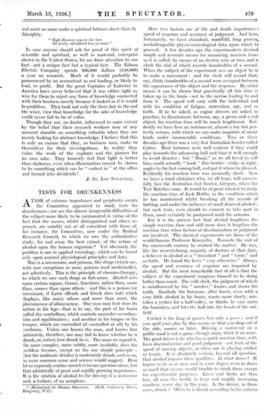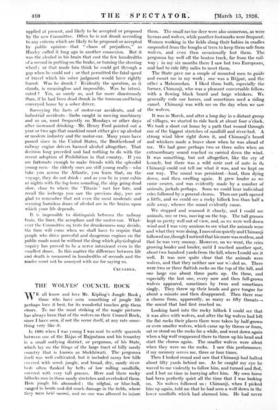B ESTS FOR DRUNK E NNESS A TASK of extreme importance and perplexity awaits
o- the - Committee appointed to study tests for drunkenness : nor are the almost insuperable difficulties- of the-Subject more likely to be surmounted in virtue of the fact that the names, whilst distinguished and above re- proach, are notably not at all coincident with those of, for instance; the Committee, now under the Medical Research Council, to which we owe the authoritative study; far and away the best extant, of the action of alcohol upon the human organism.* Yet obviously the problem is one in applied toxicology, which can be based only upon assured physiological principles and data.
Man is a microcosm, and poisons, like drugs (which are, with rare exceptions or none, poisons used medicinally), -act selectively. This is the principle of chemico-therapy, to which we owe such drugs as Salvarsan. Alcohol acts upon certain organs, tissues, functions, rather than, more than, sooner than upon others : and this is a poison (or intoxicant, if Latin offends and Greek does not) which displays, like many others and more than most, the phenomenon of idiosyncrasy. One man may first show its action in his legs—that is to say, the part of his brain called the cerebellum, which controls muscular co-ordina- tion and equilibration ; and another in his tongue or his r- temper, which are controlled (if controlled at all) by his cerebrum. Unless one knows the man, and knows him intimately, therefore, one may fail to know whether he is drunk, or, rather, how drunk he is. The more we regard it, the more complex, more subtle, more insoluble, does the problem become, except on the one simple principle— that the moderate drinker is moderately drunk, and so on, as mere common sense and science would suggest. Here let us expressly confine ourselves to one question alone, but that admittedly of great and rapidly growing importance. It is the relation of alcohol to the driving of a motor-car and, a fortiori, of an aeroplane.
* Alcohol and the Human Organism. (H.M. Stationery °nice,
Kingsway, W.C.?
Here two factors are of life and death importance : speed of response and accuracy of judgment. And here, fortunately, we have abundant, manifold, long proven, unchallengeable physio-toxicological data upon which to proceed. A few decades ago the experimenters devised simple and accurate means for measuring reaction time, as it is called, by means of an electric wire or two, and a clock the dial of which records hundredths of a second. When the subject of the experiment sees an object he is to make a movement : and the clock will record that, say, thirty-hundredths of a second were occupied between the appearance of the object and the response. By other means it can be shown that practically all this time is taken up in the brain—not in the nerves leading to and from it. The speed will vary with the individual and with his condition of fatigue, starvation, age, and so forth. If he be asked, as engine drivers are asked in practice, to discriminate between, say, a green and a red object, his reaction time will be much lengthened. Evi- dently we have here an instrument, almost a toy but per- fectly serious, with which we can make inquiries of ma-ny kinds under innumerable conditions. Two or three decades ago there was a very fast Australian bowler called Cotter. Most batsmen were well content if they could play towards the advancing ball and time it well enough to avoid disaster : but " Ranji," as we all loved to call him, could actually " hook " this bowler—strike at right- angles to the fast coming ball, and put it where he pleased. Evidently his reaction time was unusually short. Now we have a total abstainer who, we all hope, will success- fully face the Australian fast bowler, Gregory, when the Test Matches come. It would be of great interest to study the reaction time of Jack Hobbs, in the condition which he has maintained whilst breaking .all the records of batting, and under the influence of small doses of alcohol : but such tests, even .should he consent to take part in them, must certainly be postponed until the autumn.
For it is the proven fact that alcohol lengthens the simple reaction time and still more does it lengthen the reaction time when factors of discrimination or judgment are inVOlved. The classical experiments are thoSe of the world-famous Professor Kraepelin. Towards the end of the nineteenth century he studied the matter. He was, like the overwhelming majority of doctors at that date, a believer in alcohol as a " stimulant " and " tonic," and so forth. He found the facts " very otherwise." Always the speed and accuracy of response arc impaired by alcohol. But the most remarkable fact of all is that the subject of the experiment imagines himself to be doing better than usual. The cold clock, the judgment of which is uninfluenced by the " mocker," knows and shows the truth. Shnilarly the batsman, after lunch, even with a very little alcohol in his brain, reacts more slowly, mis- takes a yorker for a half-volley, or thinks he can carry the boundary, and hits the ball into the hands of the out- field.
Cricket is the king of games, but only a game : and if you spoil your play by this means or that you drop out of the side, sooner or later. Driving a motor-car on a public road is not a game, though many think it no more. The good driver is lie who has a quick reaction time, with keen discrimination and good judgment--not least of the speed of moving objects, as when one is playing cricket or tennis. It is absolutely certain, beyond all question, that alcohol impairs these qualities. In what doses ? It begins to do so at once and in some degree even in doses so small that no one would trouble to drink them except for experimental purposes. Lives and limbs are thus lost, all over the world, in large and rapidly increasing numbers, every day in the year. Is the driver, in these cases, drunk ? Often he is drunk according to the criteria applied at present, and likely to be accepted or proposed by the new Committee. Often he is not drunk according to any criteria which are likely to be proposed or accepted by public opinion—that " chaos of prejudices," as Huxley called it long ago in another connexion. But it was the alcohol in his brain that cost the few hundredths of a second in putting on the brake, or turning the steering -wheel ; or that made him think he could get through a gap when he could not ; or that permitted the fatal speed of travel which his sober judgment would have rightly feared. Was he drunk ? Evidently the question, as it stands, is meaningless and impossible. Was he intoxi_ cated ? Yes, as surely as, and far more disastrously than, if he had been dead drunk in the tonneau and being conveyed home by a sober driver.
Surveying the facts of motor-car accidents, and of industrial accidents—limbs caught in moving machinery and so on, most frequently on Mondays or other days after increased drinking—Mr. Henry Ford pointed out a year or two ago that mankind must either give up alcohol or modern industry and the motor-car. Many years have passed since in the United States, the Brotherhood of railway engine drivers banned alcohol altogether. That decision long preceded and had nothing to do . with the recent. adoption of Prohibition in that country. If you are fortunate enough to make friends with the splendid young men—the elderly ones are still young really—who take you across the Atlantic, you learn that, on the voyage, they do not drink : and as you lie in your cabin at nights with the fog-horn sounding, the ship going dead slow, close to where the ' Titanic ' met her fate, and recall the icebergs you saw the previous day, you are glad to remember that not even the most moderate and seeming harmless doses of alcohol are in the brains upon which your life depends.
It is impossible to distinguish between the railway train, the liner, the aeroplane and the motor-car. What- ever the Committee ou tests for drunkenness may decide, the time will come when we shall have to require that people who drive powerful and dangerous engines on the public roads must be without the drug which physiological inquiry has proved to be a nerve intoxicant even in the smallest doses. In this matter the difference between life and death is measured in hundredths of seconds and the reader must not be annoyed with me for saying so.
CRUSADER.































































 Previous page
Previous page